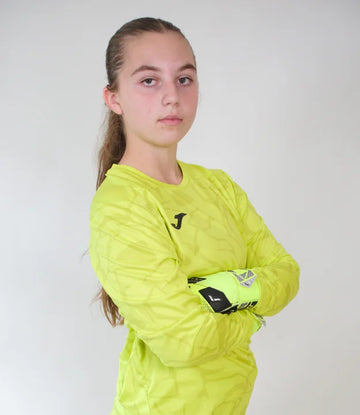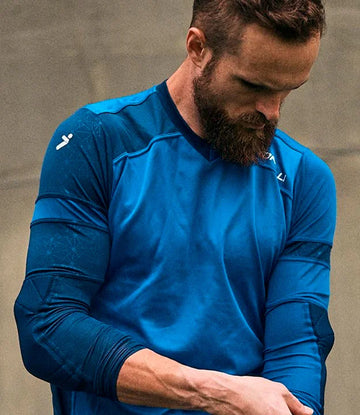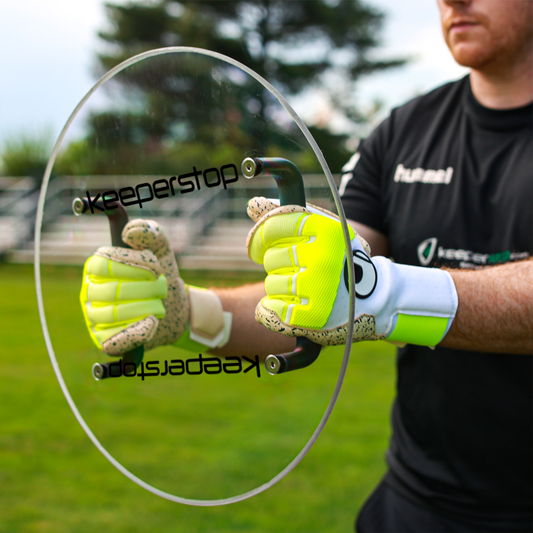Goalkeeper Glove Maintenance: Tips and Tricks
Every goalkeeper knows the feeling: you’ve just snagged a game-winning save, but your gloves are showing signs of wear. It’s frustrating to see professional goalkeeper gloves lose their grip after a few uses, especially when you’ve invested in a quality pair. But what if you could extend the lifespan of your gloves for soccer with just a bit of care?
Proper glove maintenance isn’t just about keeping them looking good—it’s about ensuring peak performance and durability. In this guide, we’ll cover some essential tips and tricks to help you preserve your gloves, so you can keep your grip strong and your confidence high, game after game. From cleaning and drying to storage and conditioning, we’ll show you how to get the most out of your gloves for soccer.
Cleaning Your Goalkeeper Gloves
Proper cleaning is essential for extending the lifespan of your gloves, maintaining their grip, and keeping them fresh. During training and games, goalkeeper gloves collect dirt, sweat, and bacteria. The abrasiveness of dirt erodes the soft latex from the outside, while sweat and bacteria deteriorate the gloves from the inside out. This combination can also lead to unpleasant odors, which makes cleaning all the more important.
Cleaning Methods
Hand washing is the safest and most effective way to clean your gloves. Use a mild, low-foaming soap that’s free of dyes, phosphates, and harsh chemicals. Dish soap, shampoo, and most hand soaps are too harsh and can damage the latex. A glove-specific wash, like Reusch Re:Invigorate Glove Wash, is an excellent choice for removing dirt, sweat, and bacteria without compromising the latex. Gently scrub the gloves with your fingers to ensure you clean all areas, paying attention to the palm and fingers where dirt and sweat accumulate.
Rinsing and Drying
After cleaning, rinse the gloves thoroughly, squeezing out the water multiple times until there are no more soap suds. Leftover soap can dry out the gloves, so make sure to rinse well. Avoid wringing the gloves, as this can damage the stitching. If you prefer, you can use a washing machine without a rotating arm to rinse and spin out excess water.
Once clean, hang the gloves to dry in a safe spot, away from direct sunlight or heat sources. Never use a dryer or attempt to speed up the drying process, as this can damage the latex. Properly washed and rinsed gloves need at least 24 hours to dry completely before they’re ready for use again.
Pre-Wash and Maintenance Tips
Many manufacturers recommend a pre-wash for goalkeeper gloves to remove any chemicals and activate the latex properties before first use. Dampening all-weather foams before use also helps with grip and durability. Just remember, whatever you put into your gloves, you should take them out—always rinse thoroughly after dampening them.
For gloves that are heavily stained, smelly, or have been in the rain, cleaning is always a good practice. Aim to wash your gloves once a week based on how often you use them. Clean gloves perform better and last longer—plus, goalkeepers with fresh gloves tend to have more friends!
Proper Glove Storage
After a game or training session, it's tempting to toss your gloves into a bag and forget about them, but this can be detrimental in the long run. Dirt and sweat left to dry inside the gloves will erode the latex over time, causing them to crack and lose their grip. If you have another game the following day, instead of washing the gloves again—which could leave them too wet—wipe the palms with a moist towel to remove dirt. Wrapping your gloves in a moist towel keeps them hydrated for the next match without over-soaking them.
Storage Techniques
Never store your gloves with the palms together, as they can stick and tear when you try to separate them. A glove bag is the best option for storage, as it allows the gloves to breathe and prevents the latex from sticking or becoming misshapen. Ideally, store your gloves in a cool, dry place away from direct sunlight and heat sources, which can damage the latex and shorten their lifespan.
If your gloves are wet, don't leave them in this condition for too long. Storing wet gloves for more than a day can lead to unpleasant odors and mold growth. Ensure they dry properly, either by air drying or using a towel to wick away excess moisture.
Goalkeepers who rely on their gloves for performance—whether professionals or weekend warriors—must treat them with care. While top-level players often have the luxury of switching gloves after just one or two matches, most of us need to make our gloves last. Proper storage is an easy but essential step in extending the life of your goalkeeper gloves.
Addressing Common Issues
Goalkeeper gloves are designed to withstand intense play, but they aren't invincible. From mildew to wear and tear, several issues can arise over time. Luckily, many of these problems can be prevented or fixed with a bit of care and attention.
Mildew: Prevention and Treatment
Mildew is a common problem when gloves are stored improperly or left wet for too long. The combination of moisture, dirt, and sweat creates the perfect breeding ground for bacteria and mildew. To prevent this, always ensure your gloves are dried thoroughly after every use. Don’t leave them in a wet bag or in an enclosed space where air can’t circulate. If mildew does develop, gently scrub the affected area with a mild soap or specialized glove cleaner, then rinse thoroughly. Avoid harsh chemicals or detergents, as these can damage the latex. After cleaning, let your gloves dry naturally in a well-ventilated area.
Tears and Punctures: Minor Fixes
Even the most durable professional goalkeeper gloves can get small tears or punctures. While these can’t always be fully avoided, addressing them quickly can prevent further damage. For minor tears, you can use latex repair glue or a special glove adhesive to seal the cut. Apply the glue carefully and let it cure for the recommended time. When punctures happen, try to avoid pressing too hard on that area during play, as this could cause the damage to spread. If the tear is large or the glove is losing its structure, it might be time to retire the pair.
Loss of Grip: Causes and Solutions
A goalkeeper's grip is essential for catching, controlling, and distributing the ball. Over time, gloves can lose their grip due to dirt buildup, wear, or exposure to harsh weather. The primary cause of reduced grip is dirt and debris, which can coat the latex and impair its effectiveness. To restore grip, start by cleaning your gloves thoroughly using a mild soap or specialized glove wash. Rinse them well and let them air dry. Once dry, lightly dampen the palms with water or a grip-enhancing spray to activate the latex. Some goalkeepers even lightly spit on their gloves (a technique older players swear by) to boost grip, though this can be a less sanitary option. If your gloves are still losing their grip despite cleaning, it might be time to replace them, as latex naturally deteriorates with use.
Recommended Products
To keep your gloves for soccer performing at their best, it's essential to use the right products for cleaning and maintenance. At Keeperstop, we offer a range of items that are designed to extend the life of your goalkeeper gloves and maintain their grip.
Reusch Re:Invigorate Glove Wash
This specialized glove wash is perfect for keeping your professional goalkeeper gloves in top condition. It’s formulated to remove dirt, sweat, and bacteria without damaging the delicate latex. Using Re:Invigorate Glove Wash will not only help preserve your gloves’ grip but also keep them smelling fresh, ensuring your gloves are ready for the next match. Regular use will also prevent the build-up of grime and reduce the chances of mildew, keeping your gloves performing at their best.
Glove Glu
For extra grip and durability, Glove Glu is an excellent option. This product enhances the latex grip on goalkeeper gloves, even in challenging conditions. Applying Glove Glu helps restore the latex’s natural stickiness, making it easier to catch and control the ball. It’s ideal for rainy days or wet conditions where your gloves might lose their usual grip. Just apply a small amount to the palms of your gloves for a noticeable improvement in performance.
Glove Bag
Protect your gloves between games with a glove bag. This bag allows your gloves to breathe while preventing them from getting crushed or damaged when stored. It’s a simple but effective way to protect your gloves from dirt and external elements, ensuring they last longer and maintain their shape.
Frequently Asked Questions
Can I use a washing machine to clean my gloves?
While it may be tempting to throw your gloves in the washing machine, it’s generally not recommended. The machine's agitation can damage the delicate latex, leading to tears or loss of grip. Instead, hand wash your gloves with a mild soap to ensure the gloves maintain their shape and integrity. For a deeper clean, you can soak your gloves in a bowl of water with glove wash, but avoid using a washing machine.
What should I do if my gloves get wet?
If your gloves get wet during a game or practice, the first thing to do is gently rinse them with clean water to remove any dirt. After rinsing, you can either air dry them or use a moist towel to keep them damp if you plan on using them soon. Never wring your gloves or dry them with direct heat, as this can damage the latex. For proper care, ensure your gloves are completely dry before storing them for long periods.
How can I tell if my gloves need to be replaced?
Goalkeeper gloves don't last forever, and you’ll start to notice when it's time for a new pair. Look out for the following signs:
-
Loss of grip: If your gloves aren’t gripping the ball as they used to, the latex might have worn down.
-
Tears and punctures: Small tears or rips that can’t be repaired could indicate it’s time for a new pair.
-
Excessive wear: If the latex has completely worn away from the palms, or if the gloves feel less comfortable due to broken stitching, it's a clear sign that they need replacing.
Keep Your Gloves in Top Shape
Proper goalkeeper glove maintenance is essential for preserving performance, comfort, and longevity. By regularly cleaning your gloves with mild soap, storing them correctly, and addressing common issues like mildew or minor tears, you can extend the life of your gloves and ensure that they continue to perform at their best. Always remember to handle your gloves with care, and they will reward you with superior grip and durability.






 Gloves
Gloves
 Jerseys
Jerseys
 Gear
Gear
 Brands
Brands
